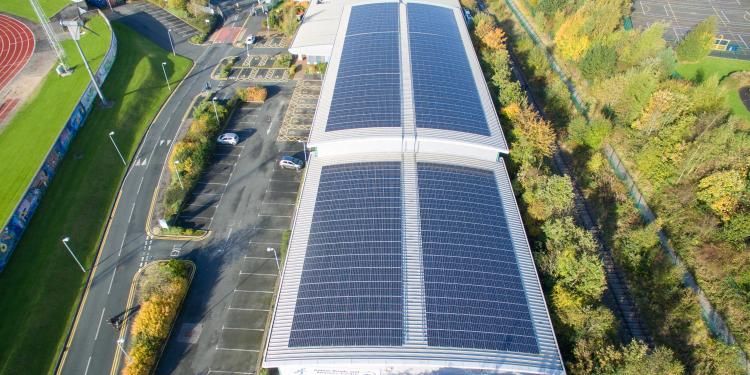Scheme:
Phase 1 Public Sector Decarbonisation Scheme
Technologies used:
Solar PV, LED lighting, District heating connection
Region:
North East
Client type:
Local authority
Your partner for a low carbon future

Phase 1 Public Sector Decarbonisation Scheme
Solar PV, LED lighting, District heating connection
North East
Local authority
Annual financial savings
Lifetime financial savings
Annual carbon savings tCO2e*
Leeds City Council received £25.3m from the Public Sector Decarbonisation Scheme (PSDS) to install a range of decarbonisation measures across the city.
The PSDS, launched in 2020 by the Department for Business, Energy and Industrial Strategy (BEIS), and delivered by Salix, was introduced to encourage green investment, supporting the Government’s net-zero and clean growth goals.
The installation of multiple technologies will substantially reduce the city’s carbon emissions and help to simulate the local green economy by safeguarding and creating approximately 330 jobs as part of the COVID-19 recovery.
The Council is on track to halve its carbon footprint by 2025 as part of its emissions target of net-zero by 2030, 20 years earlier than the UK. Leeds City Council is a long-term proponent of sustainability and has been working with Salix since 2006 to upgrade its energy technologies in public buildings across the city.
This announcement is great news for the environment and good news for Leeds. We are on track to halve our own emissions by 2025 and by the end of the year.
The Council is looking to set an example for other businesses and organisations across the city by becoming carbon-neutral within their own organisation. Some examples of how the council is looking to achieve this are:
The Leeds PIPES network is a flagship £40m programme that provides affordable, waste powered heat and hot water to homes and businesses. District Heating Networks replace old, inefficient gas boilers with low carbon heat from the Recycling and Energy Recovery Facility (RERF) in Cross Green.
Funding was secured from a variety of European, national and regional sources in addition to significant investment from the council. The second phase of the project was enabled by a grant from the Heat Network Investment Project. Leeds has become the UK’s flagship for new heat networks. The network connects 2,000 properties and four key council buildings (Civic Hall, Town Hall, Leeds Museum and the Art Gallery).
Work with partners such as Vital Energi has resulted in the network supporting more than 400 jobs. The PIPES network has a capacity of 33MW and is expected to provide up to 175GWh of low-carbon heat per year.
The network also improves air quality, supports the local economy through job creation and reduces fuel poverty for Leeds City Council tenants. Further expansion is planned into the South Bank, with a final vision of a fully connected network with multiple energy centres.
August 2021
*tonnes of Carbon Dioxide, calculated using Green Book emissions factors for electricity published by the government.
